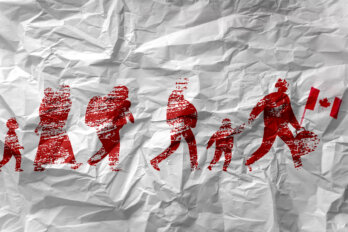My doorbell gets a lot of use these days. Not from neighbours—who knows their neighbours anymore?—but from the UPS man. From the FedEx woman. From the Canada Post carrier. Ding-dong. Packages arrive. Sign here, they say, and I scrawl something that looks like the coastline of Vancouver Island on something that looks like an Etch A Sketch. How that signature is legally binding, I have no idea.
The packages pile up in the front hall. Slippers from L.L. Bean. Pyjamas from Lands’ End. Gadgets from Lee Valley. And from Amazon Prime, everything else.
It’s so efficient.
It’s so effortless.
It’s so, well, impersonal.
It’s only a matter of time until a data-mined algorithm makes all these decisions for us with everything instantly paid for with a cybercurrency. Gift shopping has become nothing more than purchase orders fulfilled.
Wait, am I doing it again? Am I sounding cybercranky?
You know what I miss about the holiday season? I miss selling stuff. I miss being behind the counter at a bedecked department store during the final crush of Christmas shopping. I miss appearing like an angel of mercy to not only solve mercantile problems but to gift wrap the solutions as well. I miss deducing the perfect present based on a series of skillful questions. I miss the little dramas that played out all around me. I miss the ministering “can I help you?” approach. Of course, I can help you! I help everyone! That’s my job! Tell me what you quest for, and I shall see your dream achieved.
For several years while I was in university, I held a part-time job as a clerk behind the counter of the French-perfume bar at Eaton’s Pacific Centre. Eaton’s would vanish from the Canadian retail landscape in 1999, but this was the ’80s and Eaton’s was still a purveyor of dreams.
Pacific Centre is at the very heart of downtown Vancouver and Eaton’s French-perfume bar was front and centre in the store. Two sweeping arcs led down from the front doors of the store onto the selling floor, and that’s where we were: the jewel of the operation. The morning light would bounce in from Granville Street, setting fire to the faceted glass bottles but also revealing the dust that accumulated at an inexplicable rate. From our vantage point, we could read the weekly retail rhythm: Monday was usually household staffs’ day off—news to me!—so the bewildered wives of lumber barons would go shopping. Women shopped at midday, men shopped at the end of the day, teenagers were weekend shoppers.
The tops of our cabinets were crowned with giant, colourful perfume bottles called factices. Factice is French for dummy or fake. Several times a day, people would ask about those giant bottles, and the day came, of course, when a guy grabbed one and made a dash for the door. The really good stuff was all behind glass. Capless tester bottles sat in galleried trays on the glass display cases. But more than any particular fragrance, I remember the smell of Windex: spraying and wiping, wiping and spraying. Over time, the glass fogged over from corrosive effects of fingerprint removal and the scour of purse bottoms. The lower-priced fragrances were piled, unprotected, on tables on the selling floor. Tigress, Tabu, Love’s Fresh Lemon, Charlie, Blue Grass, Emeraude, and Babe.
Merchandise was pocketed with surprising frequency, but the bolder operatives had more audacious ploys. For a while, I watched a family of thieves work the aisles, depositing pilfered items into secret garment linings. They dressed like the cast of Downton Abbey, erroneously thinking they were deflecting suspicion. I don’t know if they were ever caught. Store detectives milled around, working a sudden pincer movement on less-successful thieves.
It was a swell job. Honestly. Perfume! The most useless, wonderful stuff in the world! It was like selling adjectives and verbs. And selling them to rubes.
The rest of year belonged to careful consumers who knew what they wanted and weren’t likely to be dazzled by packaging and deadlines. But at Christmas? Christmas brought out a certain desperation, a certain bewilderment, a certain commercial excess.
Young swains would appear, vacant eyed, before me. “What’s she like, this girlfriend of yours?” I would ask. The answer was always the same. She didn’t like anything too heavy, too flowery, too strong…too perfume-y. She was sporty. She was casual. She was conservative. Not once did a suitor describe his beloved as an introspective extrovert who liked pungent cheeses and skeet shooting and appreciated night-blooming jasmine. These girlfriends were akin to one slice of Wonder Bread after another. My suggestion of L’Air du Temps, a fluttery, moderate floral, usually met with approval.
Briefcase-carrying businessmen would approach the counter with very specific requests. They wanted something for the hostesses of the restaurants that they frequented to entertain their clients. It had to meet very careful constraints: elegant and impersonal. Nothing that implied flesh; Lanvin’s My Sin, the olfactory equivalent of a slinky black cat, would never do. No body lotions, no bath oils, no talcs, not even soap. In fact, perfume, given its association with pulse points, was too carnal a choice. A refreshing eau de toilette ticked off all the boxes. Thinking back now, I wish I had worked out a kickback program with the hostess at the Le Pavillion, the restaurant at the Four Seasons. I did my best to mix it up for her so that she wasn’t drowning in Miss Dior eau de toilette. She probably used her inexhaustible supply to de-ice her car windows.
My favourite customers were the little boys. The exchanges were like something straight from a Hallmark movie-plot generator. Imagine freckle-faced lads barely able to see over the counter. Imagine the solemn entreaty that they wished to buy perfume for their mothers. Imagine a fist unfurling a sum too small to acquire even the lowliest bottle of Prince Matchabelli’s Wind Song. (You remember Wind Song, don’t you? The dime store fragrance with the ear worm jingle: “I can’t seem to forget her/her Wind Song stays on my, Wind Song stays on my miiiiind.”)
The final days before Christmas became a parade of earnest supplicants setting out to create one of the signature moments in two people’s lives—buying the first gift for your parent. I was putty in their grubby little hands. In a time before GoFundMe campaigns, I became their sole sponsor. My only solution was to elaborately gift-wrap a selection of the better fragrance samples and present them to the striplings. Back then, some of the more prestigious lines offered impressive, wee versions of their dresser-table sizes as samples. The lads accepted this largesse unwittingly.

Marion wouldn’t have been so accommodating. Marion would have sent the boys away, explaining that they were dismal failures now and probably would be for the foreseeable future. Marion worked alongside me. She was a full-timer. And an old-timer. She knew bus schedules and what soup was served on what days in the staff cafeteria. She had no children and her bookend of a husband showed up each evening in a belted, dun-coloured trench coat to collect her from work. Marion and her husband allowed for every malign contingency. Somewhere on their bodies, they secreted stretchy rubber things that they could slip over their shoes in the event of an unexpected rainstorm. They were never without an umbrella, even in August.
Marion didn’t like to wait on customers; she preferred to run the cash register. She was mildly disapproving of most everything and especially of me. If I spoke about my studies, she would stare into the middle distance and act like I’d lapsed into Swahili. When I told her I was saving my money to go to Europe, she asked me why. I answered that I wanted to have sex with a matador. Again, she stared into the middle distance. I’m not sure if she was trying to visualize matadors or sex.
Now, Olive, the department manager, was a different story. Olive came from county Cork, and she’d worked at the venerable Brown Thomas in Dublin. Olive had mastered a deference that was the opposite of subservience and imported a magisterial decorum to the selling floor. Each transaction was elevated by its august execution. “And does madam care for the single or for the triple boxed soaps?” Her powdery brogue atomized each carefully crafted question. Olive would say things like, “An excellent choice and a far better value, if I may say, madam.” Madam always went away imbued with a sense of discernment and superior competencies.
Olive would have been described as jolie laide, were she French. Nevertheless, Olive was alluring. She favoured austere gabardine skirts offset by sensuous crepe de Chine blouses. A man from out of province flew in to see her with some frequency. She would surreptitiously dab Guerlain’s Shalimar on her wrists when he would show up. I suspected he was married. She was not.
Olive taught me about layering. Olive smelled complex, but in the way a forest smells complex. Not overpowering, but decidedly and intricately itself. She believed perfume was an architectural process that started with laying down a good foundation—the actual perfume—followed by the fractionally lighter eau de parfum, then either a watery eau de toilette or, even more diluted, eau de cologne. A woman who understood the responsibilities of this fragrance construction could be counted on to employ both bath oil and talc.
It was fragrance as fortification. It was fragrance as artillery.
But mostly it was upselling.
Olive was on commission.
My wages were underwritten by the company that distributed Joy perfume. At the time, Joy perfume was marketed as “the costliest perfume in the world.” Never mind how it smelled, it was gobsmackingly expensive, and that was what mattered most. I liked the way it smelled—a classic rose-and-jasmine concoction that was inaugurated as an antidote to the Great Depression—but I loved the way the bottle looked: a flattened obsidian flask crowned with a carnelian Bakelite stopper. One year, the distributor gave me several “purser-sized” bottles of Joy. The simple, gold-capped glass cylinders retailed for more money than I made in a week, but they were about as useful to me as empty bullet cartridges. Having no personal interest in perfume, I hung them from my boyfriend’s Christmas tree for his mother to find on Christmas morning. She coveted perfume; I didn’t.
But I did understand its power. Back in those days, I lusted after a teaching assistant at my university. He had a particular odour. I can summon it still: citrusy, verging on acrid. I found it intoxicating. Decades later, I was walking down Georgia Street and a man with the same scent passed by me. In that instant, I pivoted on my heels and followed him, drawing up close at the stoplight, inhaling the air around him.
That’s what perfume is: our incorporeal expression. It is where intangible intersects with evocative. Today, I have perfumes that transport me back to different times, different relationships. My first mother-in-law had taught her son that a woman should never have to buy her own perfume. I can’t help but think of him—of us—whenever I smell Opium, Paris, or Calyx perfumes. I also think of him whenever I sniff a carton of milk that’s gone off, but that’s a story for another time.
I used to believe that I could, at twenty paces, guess what fragrance a person would buy. One day, though, I was stymied by the woman holding back at the farthest reach of the counter. She seemed to command attention while deflecting it. I made my way over to her. She had a way of keeping her head tucked so that I couldn’t get a clear sightline to her face, which seemed somehow familiar. She was looking for perfume for her mother. She described a clear-eyed woman, full of life and laughter. And then she said her mom had cancer and she couldn’t think of what to give her.
Her mom was brave, she said, and very sick. She mentioned that her mom liked Guy Laroche’s popular scent Fidji and I countered that Laroche had introduced a new one: J’ai Osé. I told her that it translated to “I dare.” As I sprayed the tester into the air above her head, she looked up, and I realized it was Rhoda Morgenstern from the Mary Tyler Moore Show. I couldn’t think of her real name until she handed me her credit card: Valerie Harper. She bought the whole line. Including the talc.
There are other customers I’ll never forget. One man came every Christmas. I know this because Olive told me. The first time I saw him, she exhaled and said Ahhh, he’s here, nodding in the direction of the older gentleman in a Harris tweed overcoat. He bought the same thing every Christmas: a bottle of Caron’s Nuit de Noël. And here he was, with the predictability of the decorated tree in Stanley Park’s Lost Lagoon, to buy his ritual gift. Olive nudged me in his direction. She knew I took an ingenue’s pleasure in these dioramas.
It was a swift transaction, cordial and efficient. I remember he bid me a Happy Christmas, which puzzled me. An aristocrat of the perfume world, Nuit de Noël came in a dignified anthracite flacon with scant embellishments. We kept so few bottles of it, and no testers, so I can’t tell you from experience what it smelled like, but I’m told it’s best described as cinnamon roses.
You can hardly find it anywhere today. Well, you can find it online.
But you won’t find the man in the Harris tweed overcoat online.
Or the little boys.
Or the empty-headed swains.
Or the audacious pilferers.
And you won’t find stories like these on your doorstep when they tell you to Sign here, please.




